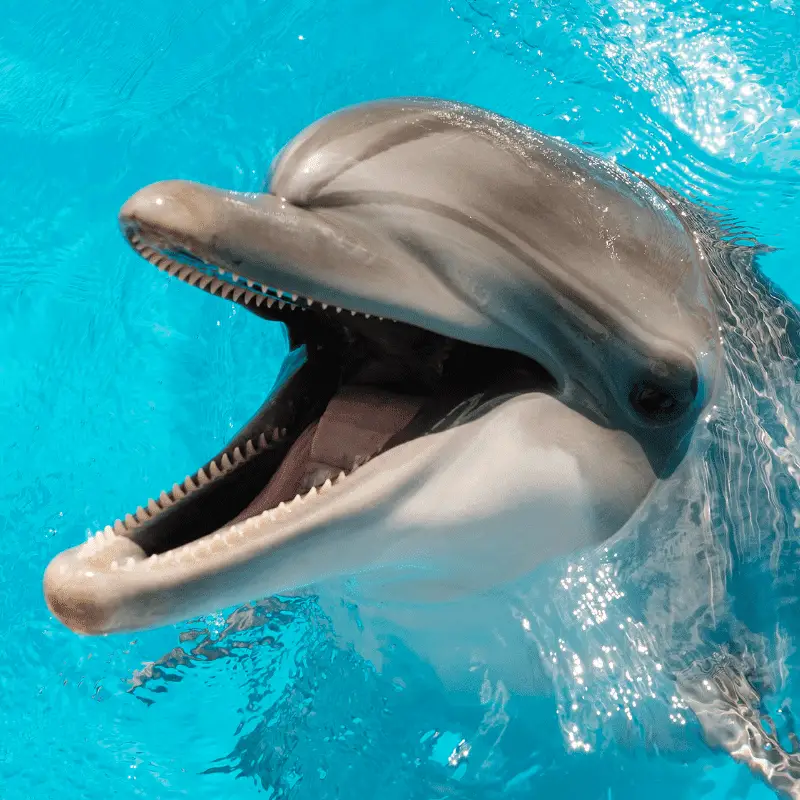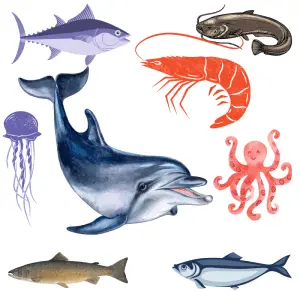Dolphins are wild animals. Dolphins do not like being around people or kissing them. So they do not kiss people voluntarily. In dolphin shows, they kiss people because they have to. None of this is a natural behaviour. Every captive dolphin who exhibits this kind of behaviour has been trained over a long period to perform this behaviour correctly. In other words, the dolphins are forced to kiss people, and I am sure If the Dolphins had a choice, kissing wouldn’t be one of them!
Even swimming with dolphins is not safe for either you or the dolphins. Dolphins are wild animals, and it has not been possible for humans to domesticate them.
It does not matter what the Dolphinaris across the world tell you about their behaviour. Dolphins are one of the top predators of the ocean world and are not built to kiss humans.
Dolphins are even able to kill sharks. So, treating these animals with the respect they deserve would be best.
Aggressive Dolphin Behaviours
Even though dolphins do not show predator hunt behaviour towards people, they can sometimes be aggressive to people and other dolphins. Sometimes dolphins can even cause self-harm.
It does not matter whether the dolphins are bred in captivity. We cannot domesticate these animals.
Common aggressive behaviours that dolphins showcase towards people:
- Biting
- Head Jerks
- Dragging Underwater
- Pushin people into deeper water
Injuries
Because of the dolphins’ aggressive behaviour, multiple skin abrasions, broken bones, and other injuries have been documented over time: the captivated dolphin causes dolphin-related injuries.
Captive Tanks
Most Dolphinaris keep their dolphins in highly chlorinated water safe for humans. But this highly chlorinated water is not suitable for the dolphins as they have to stay in that water day and night. As a result, dolphins develop chemical burns on their eyes and skin, and in some cases, they even cause blindness.
Even with such painful and dangerous precautions as chlorine, harmful disease transmission can still happen between dolphins and humans.
Do dolphins play with dogs?
No, dolphins do not like to play with dogs. Dolphins are curious about dogs, and due to their intelligence, they can be seen close to a dog on infrequent occasions. Dolphins often showcase wolf-like behaviour, and they live and hunt in packs.
It should not be considered play if you see a dog and a dolphin together. The dolphin was probably curious about the dog and was trying to check it out. We should not interpret this kind of behaviour as a sign of the harmless nature of the dolphin. They are still wild animals who can kill.
Are dolphins dangerous to humans?
Even though dolphins have an impressive reputation for being incredibly friendly towards humans, that does not mean these wild animals are not dangerous. There is no doubt that dolphins are incredibly intelligent animals, but that does not make them safe.
There are several examples where dolphins are responsible for fatal and vicious attacks on humans. Dolphins have sharp teeth, which are used for gripping and ripping apart their prey.
If these animals feel threatened or disrespected, they will not hesitate to bite humans. There are dozens of examples of dolphins biting humans or dragging them underwater.
In some instances, dolphins do more than bite humans. While attacking a person, a dolphin can land strong punches with its snout. As these marine animals have tremendous power, they can cause significant human injury with a single blow.
As these marine animals are very intelligent, they often devise unusual attacking and trapping of their prey. It does not take much for a dolphin to create a unique plan of attack if they want to harm you. So, if you think you have studied a dolphin enough and know all its behaviour, you are wrong.
What to do if a dolphin approaches you?
You should not engage or try to interact with the dolphin if one approaches you while swimming in the sea. The dolphin is most probably curious about your presence in the water.
As they glide by your side, the urge to reach out and pat them can be overwhelming, but you should restrain yourself as it can quickly become dangerous. It is always better to take slow but measured steps to move away from the area.
Do not swim after or chase the dolphin in the sea. These marine animals are mighty and graceful swimmers.
Also, if the dolphins flap its tail on the surface of the water or even clap their jaws at you, you should be scared. These are the most common signals that convey the displeasure or annoyance of the dolphins.
If a dolphin tries to grab your arm or leg in its Jaws, do not struggle or try to get it away. You will injure yourself more if you do that, as dolphins have very sharp teeth.
In most cases, dolphins grab onto humans because they are curious about you. Once satisfied with its query, it will let you go in a couple of seconds.
How do dolphins behave when they see humans?
In most cases, dolphins do not approach humans at all, even though there are instances where dolphins spot swimmers in trouble and head towards them.
Dolphins show this kind of altruistic behaviour as they have emotional intelligence. You are deeply mistaken if you think dolphins are compassionate towards humans for this behaviour.
In the wild, dolphins approach humans just because of their curiosity. In most cases, when they satisfy their curiosity, they tend to move away from the human.







